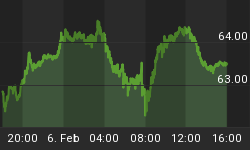Japan has already suffered through a quarter century's worth of an economic malaise because they have refused to allow the free market to work its reconciliation magic. Their reliance on government borrowing and spending to rescue the economy has proven to be a miserable failure. Because of this fact, Japanese politicians have succeeded to increase the debt to GDP ratio to 237%, which should havealready caused a collapse in Japanese Government Bonds (JGBs) and the Yen.
However, JGBs have held their value for two reasons: The Japanese own 92% of their sovereign debt; And, up until now, deflation has reigned over the island.
Since foreigners do not own a large portion of Japanese bonds, there isn't a big concern about a mass exit from JGBs due to the fear of a weakening Yen. If foreign ownership of sovereign debt was more in the area of 50% (like it is in the U.S.), there would be a palpable fear on the part of those creditors that their wealth could be wiped out upon currency repatriation--especially in light of the new administration's love affair with inflation and a falling currency. More importantly, since aggregate prices have dropped in 10 of the last 15 years and inflation has averaged a negative 0.6% in the last 4 years, holders of JGBs weren't so concerned about yields being so close to zero percent. Falling prices allowed the government of Japan to issue debt with very littlecost.
Both those conditions needed to stay in place in order for JGBs and the Yen to hold their values. Thankfully for Japan, foreign creditors still hold a very small proportion of sovereign paper. However, deflation is soon to become a thing of the past. If Shinzo Abe achieves his goal of at least a 2% inflation target, it will remove the most important support pillar for Japanese debt. In effect, the Japanese government has pulled the pin on a debt grenade that will explode in the very near future.
As of now, the Japanese 10-year note yields just 0.75%. That's a very poor yield; but since holders of Yen are currently experiencing deflation, they still are provided with a real return on their investment. But if inflation does indeed rise to 2%, the yield on the 10-year note would have to rise above3.3% in order to offer the same real yield seen today.
However, the problem is that Japan is already spending nearly 25% of all national revenue on debt service payments--despite the fact that interest rates are close to nothing. If the average interest rate on outstanding debt were to increase over 2%--or anywhere close to offering a real yield on JGBs--Japan would be paying well over 50% of all government revenue on debt service payments alone. Of course, some will say that yields won't go that high even if inflation creeps higher. But these investors should be reminded that the Japanese 10-year note was 1.8% back in May of 2008. That was not too long ago and it occurred during a time when inflation was just rising at a one percent annual rate.
If the government of Japan has to pay 50% of its income on debt service payments it will be game over for JGBs. Domestic investors will flee the sovereign bond market in search of a real return on their investments, as they collectively realize that there is zero chance of being repaid their principal and interestin real terms.
Unfortunately, it is that not only Japan which has chosen to go down the path that leads to a currency and bond market catastrophe. The BOJ wants the Yen to go lower; and yet at the same time the Fed wants the dollar to lose value as well. Both Bernanke and Shirakawa want more inflation and a weaker currency vis a vis the other. That begs the question; when two central bankers launch an all-out currency war who will win? History shows us that the answer is clear. The absolute losers will be the middle classes of both countries. And the winner will be those who have the intelligence and foresight to eschew fiat currencies and the sovereign debt they support.















